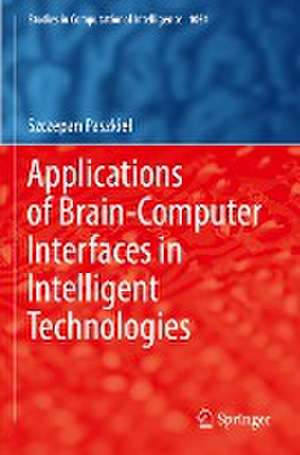Applications of Brain-Computer Interfaces in Intelligent Technologies: Studies in Computational Intelligence, cartea 1031
Autor Szczepan Paszkielen Limba Engleză Paperback – 9 iul 2023
| Toate formatele și edițiile | Preț | Express |
|---|---|---|
| Paperback (1) | 921.67 lei 43-57 zile | |
| Springer International Publishing – 9 iul 2023 | 921.67 lei 43-57 zile | |
| Hardback (1) | 927.93 lei 43-57 zile | |
| Springer International Publishing – 9 iul 2022 | 927.93 lei 43-57 zile |
Din seria Studies in Computational Intelligence
- 20%
 Preț: 449.37 lei
Preț: 449.37 lei - 20%
 Preț: 1158.26 lei
Preț: 1158.26 lei - 20%
 Preț: 986.66 lei
Preț: 986.66 lei - 20%
 Preț: 1452.76 lei
Preț: 1452.76 lei - 20%
 Preț: 168.78 lei
Preț: 168.78 lei - 18%
 Preț: 1112.30 lei
Preț: 1112.30 lei - 20%
 Preț: 565.38 lei
Preț: 565.38 lei - 20%
 Preț: 649.28 lei
Preț: 649.28 lei - 20%
 Preț: 1047.73 lei
Preț: 1047.73 lei - 20%
 Preț: 1578.96 lei
Preț: 1578.96 lei - 20%
 Preț: 643.50 lei
Preț: 643.50 lei - 20%
 Preț: 657.49 lei
Preț: 657.49 lei - 20%
 Preț: 993.28 lei
Preț: 993.28 lei - 20%
 Preț: 990.80 lei
Preț: 990.80 lei - 20%
 Preț: 989.96 lei
Preț: 989.96 lei - 20%
 Preț: 1165.69 lei
Preț: 1165.69 lei - 20%
 Preț: 1444.52 lei
Preț: 1444.52 lei - 20%
 Preț: 1041.96 lei
Preț: 1041.96 lei - 20%
 Preț: 1047.73 lei
Preț: 1047.73 lei - 20%
 Preț: 1046.06 lei
Preț: 1046.06 lei - 18%
 Preț: 2500.50 lei
Preț: 2500.50 lei - 20%
 Preț: 989.13 lei
Preț: 989.13 lei - 20%
 Preț: 1165.69 lei
Preț: 1165.69 lei - 20%
 Preț: 1164.05 lei
Preț: 1164.05 lei - 20%
 Preț: 1042.79 lei
Preț: 1042.79 lei - 20%
 Preț: 1460.19 lei
Preț: 1460.19 lei - 18%
 Preț: 1403.52 lei
Preț: 1403.52 lei - 18%
 Preț: 1124.92 lei
Preț: 1124.92 lei - 20%
 Preț: 1039.47 lei
Preț: 1039.47 lei - 20%
 Preț: 1008.11 lei
Preț: 1008.11 lei - 20%
 Preț: 1045.25 lei
Preț: 1045.25 lei - 20%
 Preț: 1275.42 lei
Preț: 1275.42 lei - 20%
 Preț: 1040.32 lei
Preț: 1040.32 lei - 20%
 Preț: 988.32 lei
Preț: 988.32 lei - 20%
 Preț: 1169.79 lei
Preț: 1169.79 lei - 20%
 Preț: 1162.37 lei
Preț: 1162.37 lei - 20%
 Preț: 1059.26 lei
Preț: 1059.26 lei - 20%
 Preț: 1164.05 lei
Preț: 1164.05 lei - 20%
 Preț: 1166.52 lei
Preț: 1166.52 lei - 20%
 Preț: 1459.38 lei
Preț: 1459.38 lei - 18%
 Preț: 1005.74 lei
Preț: 1005.74 lei - 20%
 Preț: 997.38 lei
Preț: 997.38 lei - 20%
 Preț: 1055.94 lei
Preț: 1055.94 lei - 20%
 Preț: 1284.47 lei
Preț: 1284.47 lei - 20%
 Preț: 994.08 lei
Preț: 994.08 lei - 20%
 Preț: 1048.72 lei
Preț: 1048.72 lei - 20%
 Preț: 1066.02 lei
Preț: 1066.02 lei - 20%
 Preț: 943.78 lei
Preț: 943.78 lei - 20%
 Preț: 1173.10 lei
Preț: 1173.10 lei - 20%
 Preț: 1457.72 lei
Preț: 1457.72 lei
Preț: 921.67 lei
Preț vechi: 1152.09 lei
-20% Nou
Puncte Express: 1383
Preț estimativ în valută:
176.36€ • 184.60$ • 146.79£
176.36€ • 184.60$ • 146.79£
Carte tipărită la comandă
Livrare economică 31 martie-14 aprilie
Preluare comenzi: 021 569.72.76
Specificații
ISBN-13: 9783031055034
ISBN-10: 3031055039
Ilustrații: XIV, 110 p. 64 illus., 58 illus. in color.
Dimensiuni: 155 x 235 mm
Greutate: 0.19 kg
Ediția:1st ed. 2022
Editura: Springer International Publishing
Colecția Springer
Seria Studies in Computational Intelligence
Locul publicării:Cham, Switzerland
ISBN-10: 3031055039
Ilustrații: XIV, 110 p. 64 illus., 58 illus. in color.
Dimensiuni: 155 x 235 mm
Greutate: 0.19 kg
Ediția:1st ed. 2022
Editura: Springer International Publishing
Colecția Springer
Seria Studies in Computational Intelligence
Locul publicării:Cham, Switzerland
Cuprins
Introduction.- Population models of neuronal ensembles for BCI technology.- Methods of analyzing EEG signals for the needs of BCI technology including Motor Imagery.- Application of brain-computer interface technology in neurogaming.
Textul de pe ultima copertă
The BCI technology finds newer and newer implementations. Year by year, the number of publications in this field grows exponentially. This book attempts to describe the implementation of the brain-computer technology based on both STM32 and Arduino microcontrollers. In addition, the application of BCI technology in the field of intelligent houses, robotic lines as well as in the field of bionic prostheses was presented. One of the chapters of the monograph also discusses the issue of fMRI in the context of the possibility of analyzing images made as part of fMRI through solutions based on machine learning. A practical implementation of the TensorFlow framework was presented. The fMRI technique is also often implemented in BCI solutions. The conducted literature studies show that the technology of BCI is undoubtedly a technology of the future. However, there is a need for continuous development of biomedical signal processing methods in order to obtain the most efficient implementationsin the case of non-invasive implementation of BCI technology based on EEG. The further development of BCI technology has a huge impact on the techniques of rehabilitation of people with disabilities. Nowadays, wheelchairs are being constructed, thanks to which a disabled person is physically able to direct his position in a certain direction and at a certain speed. Thanks to BCI, it is also possible to create an individual speech synthesizer, with the help of which a paralyzed person will be able to communicate with the outside world. New limb prostheses that will replace the lost locomotor system in almost one hundred percent are still being developed. Some prostheses are connected to the human nervous system, thanks to which they are able to send feedback to our brain about the shape, hardness and temperature of the object held in the artificial limb.
Caracteristici
Presents applications of Brain-Computer Interfaces in Intelligent Technologies Describes the implementation of the brain-computer technology Presents applications of BCI technology in the field of intelligent houses as well as in bionic prostheses
